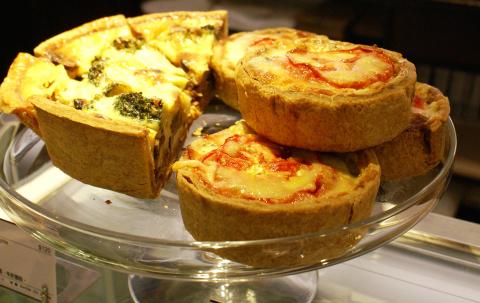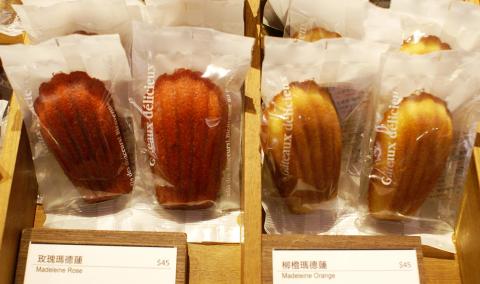Chiu Dai-yu’s (邱岱玉) first foray into Taipei’s baked goods market in 1995 fell as flat as a German flammkuchen. Consumers weren’t ready for the taste and texture of high-end European bread.
“Customers would return the bread and say there is something wrong with it — the sourdough rye, for example, is too sour,” said Chiu, who lived and worked in Germany for several years.
The bakery closed. Unwilling to abandon her dream and gambling that tastes were changing, Chiu opened Oma Ursel’s German Bakery in 1999. Twelve years later and with three branches and a German restaurant to her name, Chiu says she “no longer worries that people will return our bread because they think it’s strange.”

Photo: Noah Buchan, Taipei Times
Chiu says her bakeries grew steadily before they “took off like a plane” three years ago.
In addition to Wendel’s German Bakery and Bistro, which opened its fifth branch a few weeks back, Taipei has seen French bakery chain Paul open two locations in the capital city since 2008.
Lalos, a French bakery part-owned by renowned chef Frederic Lalos, opened its first branch outside of Paris at Taipei 101 in October, and Oma Ursel’s German Bakery and six-year-old Boite de Bijou (珠寶盒法式點心坊) plan to open more branches in the capital next year.

Photo: Noah Buchan, Taipei Times
And then there are the dozens of European-style bakeries and patisseries that have opened in hotels and shopping malls across the capital.
“The Taiwanese are traveling a lot and are very open-minded when it comes to trying different food — just look at all the different restaurants in Taipei right now that have flavors from all over the world,” said Patti Ho (何孟澔), chief operating officer of the company that runs Lalos.
“Bakeries are part of this trend,” she said.

Photo: Noah Buchan, Taipei Times
While these bakeries are changing eating habits, growing consumer demand is changing the way bakeries run their business.
All in good taste
Mention of Taiwanese bakeries used to bring to mind sickly sweet white bread, or buns stuffed with limp vegetables, all manner of processed meat, lashings of mayonnaise (or salad sauce, 沙拉醬) and greasy cheese.

Photo: Noah Buchan, Taipei Times
No longer. European bread, with its higher whole wheat and whole grain content, is firmer than the starchier, softer and ultimately less healthy varieties. More whole wheat content means more fiber, protein, minerals and vitamins.
Whereas Chiu used to spend time convincing her customers of her bread’s healthful properties, today she finds customers trying to educate her.
“Consumers have become far more savvy,” she said.
Citing fiber as an example, Chiu said it is common for her customers to ask detailed questions about how much of it individual breads contain.
“Those concerned about diabetes, high blood pressure and heart disease are especially fiber-conscious,” she said.
A study published last month by the Division of Sports and Cardiovascular Nutrition at Michigan State University in the US found that teenagers raised on high-fiber diets are less likely to have risk factors associated with those diseases. And as waist sizes expand, a high-fiber diet is becoming more important in combating obesity, the study reported.
But whole wheat bread in Taiwan might not be as healthful as customers think as labeling standards set by the Department of Health are not as strict as those in Europe.
“The standard in Germany is 100 percent. You cannot say that it’s whole wheat bread unless it’s 100 percent whole wheat. In Taiwan, it only has to contain 28 percent,” Chiu said.
Consequently, some bakeries add molasses to dough to give their bread a whole wheat appearance. “Customers used to think whole wheat bread was black. Today, people know better,” Chiu said.
Setting the standard
In addition to high-quality bread, staffing stores with professional and knowledgeable employees versed in the finer details of the products they sell has been key to the growth of European-style bakeries.
Susan Lin (林淑真), managing director of Boite de Bijou, says new employees undergo training at the company’s office above its Anhe Road branch in Taipei before they start serving customers.
Classes cover topics ranging from the various ingredients in the company’s desserts, to how to cut bread. More importantly, Lin says, she teaches her employees what to pair bread with.
“I always tell my customers that eating German bread is like eating a bowl of rice: it’s best accompanied with something else — cheese, salami or a spread like peanut butter,” Chiu said.
Boite de Bijou stocks a line of homemade jelly, jam, honey and peanut butter for this purpose. Oma’s, like the recently opened Lalos, provides samples of most of its breads.
Though Boite de Bijou’s bakers are all trained in Taiwan, Lin said they visit Japan and France every year “to learn the latest bread and dessert trends in those countries.”
Chiu said increased competition prompted her to team up with Peter Neyenhuys, a master baker with 30 years of experience under his belt.
Neyenhuys spent three years at school studying how to bake bread and two years on pastry before he was accepted as an apprentice under a master baker. After three years of starting work at 4am and learning everything from how to store products and the chemical interactions of ingredients to the ins and outs of running a business, he earned a diploma as a master baker. The whole process took 10 years.
Unwilling to speculate on the influence bakeries such as Paul have had on the market, Lin says that 85°C (85度C) bakery and coffee chain, which opened in 2004, did much to draw attention to Western-style desserts.
“The number of locations it has throughout Taiwan and its high-profile advertising and promotion of desserts ... has had a tremendously positive effect on my business,” she said.
Wu Pao-chun (吳寶春), who took top honors in the master baker category at France’s 2010 Bakery World Cup, has also drawn attention to high-end breads and desserts.
And it’s not just local consumers who are taking notice of Taipei’s bakeries. A blogger named Doreen Sia from Singapore who visited Boite de Bijou’s Anhe Road store in March, for example, raved about its desserts.
“In Singapore you wouldn’t get to enjoy pastries that are as good for this price. Plus, I haven’t even found any patisserie in Singapore that can beat Boite de Bijou,” she wrote.

May 18 to May 24 Pastor Yang Hsu’s (楊煦) congregation was shocked upon seeing the land he chose to build his orphanage. It was surrounded by mountains on three sides, and the only way to access it was to cross a river by foot. The soil was poor due to runoff, and large rocks strewn across the plot prevented much from growing. In addition, there was no running water or electricity. But it was all Yang could afford. He and his Indigenous Atayal wife Lin Feng-ying (林鳳英) had already been caring for 24 orphans in their home, and they were in

On May 2, Chinese Nationalist Party (KMT) Chairman Eric Chu (朱立倫), at a meeting in support of Taipei city councilors at party headquarters, compared President William Lai (賴清德) to Hitler. Chu claimed that unlike any other democracy worldwide in history, no other leader was rooting out opposing parties like Lai and the Democratic Progressive Party (DPP). That his statements are wildly inaccurate was not the point. It was a rallying cry, not a history lesson. This was intentional to provoke the international diplomatic community into a response, which was promptly provided. Both the German and Israeli offices issued statements on Facebook

President William Lai (賴清德) yesterday delivered an address marking the first anniversary of his presidency. In the speech, Lai affirmed Taiwan’s global role in technology, trade and security. He announced economic and national security initiatives, and emphasized democratic values and cross-party cooperation. The following is the full text of his speech: Yesterday, outside of Beida Elementary School in New Taipei City’s Sanxia District (三峽), there was a major traffic accident that, sadly, claimed several lives and resulted in multiple injuries. The Executive Yuan immediately formed a task force, and last night I personally visited the victims in hospital. Central government agencies and the

Australia’s ABC last week published a piece on the recall campaign. The article emphasized the divisions in Taiwanese society and blamed the recall for worsening them. It quotes a supporter of the Taiwan People’s Party (TPP) as saying “I’m 43 years old, born and raised here, and I’ve never seen the country this divided in my entire life.” Apparently, as an adult, she slept through the post-election violence in 2000 and 2004 by the Chinese Nationalist Party (KMT), the veiled coup threats by the military when Chen Shui-bian (陳水扁) became president, the 2006 Red Shirt protests against him ginned up by